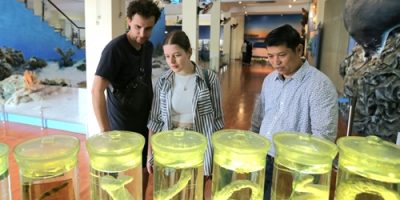
More than a year after St. Croix residents filed a class-action lawsuit against the V.I. Water and Power Authority and desalinator Seven Seas Water USVI over alleged contaminants in the island’s potable water system, attorneys Friday presented oral arguments before V.I. Superior Court Staff Master Joseph Gasper over Microsoft Teams.
A score of residents first brought the class action in November 2023 amid findings of staggeringly high levels of lead and copper found during a multiagency investigation into the source of the reddish brown tap water plaguing WAPA customers on the island.
The Virgin Islands government issued a “no drinking” advisory when they announced the test results in October. Follow-up tests found lower levels of lead and copper, and in January 2024, the U.S. Environmental Protection Agency released a final report attributing the initial findings to “various lead-containing brass plumbing components.”
“The corrosivity of the finished water from WAPA’s Richmond storage tank (e.g., high pH, low alkalinity, high chloride and low sulfate), the lack of optimized corrosion control treatment and the unique circumstances WAPA has, and is currently facing, are causing lead to leach from these brass components, particularly when the water is stagnant for more than approximately 6 hours,” according to the report.
“Water is an expensive commodity on St. Croix, and the recent drought conditions have reduced the frequency of WAPA flushing its distribution system. Some areas of the island served by WAPA regularly experience low water pressure, which may be a result of uncovered storage tanks,” the report stated.
The class action lawsuit alleged that the high salinity of Seven Seas water “contributed to the breakdown of the metal pipes and metal materials used for those pipes’ joinder” and “the resulting corrosion caused the impellers in the system’s water pumps to become clogged, which in turn caused those water pumps to fail.”
The plaintiffs alleged negligence, gross negligence, trespass, public nuisance and private nuisance, claiming that the contaminated water damaged their properties and caused personal injury.
WAPA filed a motion to dismiss the suit shortly after the plaintiffs filed an amended complaint in February 2024, arguing that the residents “repeatedly conflate the presence of discolored water, not necessarily considered harmful by the Environmental Protection Agency (EPA), with the presence of lead and copper. The overlap is so pervasive as to render uncertain the claimed impact of lead or copper, if any.”
Seven Seas filed its own motion to dismiss nearly two months later, defending its process of desalination by reverse osmosis and noting that the EPA “does not assert that [Seven Seas Water USVI] cease its reliance on RO. Nor does WAPA, which has repeatedly accepted responsibility for its own water distribution system.”
“Critically,” attorneys for Seven Seas wrote in a footnote, the complaint “almost exclusively cites preliminary water test results from EPA, while ignoring the later EPA report which disavowed the earlier findings. Per EPA’s update and its ongoing regulatory intervention, any contamination is isolated to a few locations, and attributable not to anything SSW USVI has done or failed to do, but rather to the condition of residential plumbing and downstream distribution meter components serving some of WAPA’s customers.”
Both defendants later filed motions to stay discovery, arguing — in WAPA’s case — that premature discovery, “particularly in a complex class action lawsuit with far-reaching allegations, would impose a significant burden” on the public utility.
Attorneys repeated many of those arguments Friday before Joseph Gasper, a staff master within the V.I. Superior Court’s Complex Litigation Division. Gasper said he would likely decide on the motions to stay within the next few weeks.















